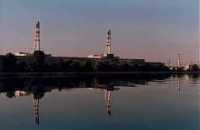Lithuania passes nuclear energy law on building new nuclear energy plant
Lithuania's parliament passed a nuclear energy law paving the way for construction of a new nuclear power plant.

The bill, which aims to replace the existing nuclear plant in Ignalina, passed by a vote of 105-4 in the 141-seat Seimas (parliament). The remaining lawmakers either abstained or were absent.
The plant in Ignalina is due to be shut down in 2009 as part of Lithuania's agreement with the European Union.
"It is very important for Lithuania to remain a nuclear energy producer and exporter," Prime Minister Gediminas Kirkilas said after the vote. "It will help us to guarantee energy independence and national security and will be of huge strategic importance for the whole region."
Lithuania, Latvia and Estonia signed a deal last year to build a new nuclear power plant, estimated to cost up to EUR4 billion (US$5.3 billion). Poland later joined the project.
A detailed financial plan needs to be drawn up before construction can begin.
All four countries fear a growing reliance on Russian natural gas after the Ignalina unit closes and have expressed a willingness to finance a new plant.
The plant is the only nuclear facility in the Baltic countries. It provides some 80 percent of Lithuania's electricity needs and allows it to export power, particularly to Latvia and Belarus.
But Ignalina is similar in design to the Chernobyl plant in Ukraine that became the site of the world's worst civilian nuclear accident in 1986, and for this reason the EU wants it closed. Lithuania shut one of the two reactors in 2004, the same year it joined the EU.
According to the new law, Lithuania, as the host country, will hold a 34 percent stake in the project. It will also establish national investment company composed of private and state capital.
However, it is unclear how Latvia and Estonia will react to the new law, since the Baltic neighbors had been hoping for larger stakes in the project.
Subscribe to Pravda.Ru Telegram channel, Facebook, RSS!




